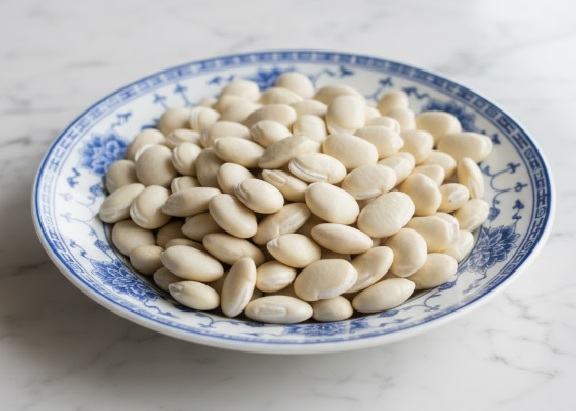Lablab Bean

Lablab Bean (Bai Bian Dou): A Strengthening Herb for the Spleen, Digestion, and Summer Heat
Introduction
Lablab Bean, known as Bai Bian Dou (白扁豆) in Traditional Chinese Medicine (TCM), is the mature seed of Dolichos lablab L., commonly called hyacinth bean or white kidney bean. Mild, sweet, and strengthening, it is valued for supporting the Spleen and Stomach, transforming dampness, and protecting the body from summer heat. Traditionally used in soups and tonics, Bai Bian Dou promotes digestion, relieves fatigue, and helps the body recover from weakness caused by humidity or poor appetite.
What Is Lablab Bean?
Bai Bian Dou is a neutral, sweet-tasting herb that enters the Spleen and Stomach meridians. In TCM, it is considered both a food and a medicine, often used to tonify qi and aid in digestion while being gentle on the system. The beans are typically white or pale yellow, slightly flat in shape, and have a mild nutty aroma. When cooked, they impart a light, creamy flavor that blends well with rice, grains, and other herbal ingredients in soups.
Health Benefits of Lablab Bean
Strengthens the Spleen and Aids Digestion
Bai Bian Dou supports the Spleen’s role in transforming food into energy, helping improve digestion, appetite, and nutrient absorption. It is useful for symptoms like bloating, diarrhea, or fatigue from weak digestion.
Transforms Dampness and Relieves Diarrhea
By promoting the transformation of dampness, Lablab Bean helps regulate water metabolism and is beneficial for loose stools or digestive discomfort caused by humidity and dietary excess.
Clears Summer Heat and Prevents Heatstroke
In TCM, Bai Bian Dou protects against summer heat combined with dampness — a condition that can cause nausea, poor appetite, and lethargy. It gently cools and strengthens the body without being harsh or draining.
Boosts Energy and Reduces Fatigue
Because it nourishes qi and supports digestion, it naturally increases stamina and helps the body recover from overexertion or heat exhaustion.
Supports Recovery and Immunity
Rich in plant protein and easily digestible, Lablab Bean restores strength after illness and supports immune resilience, especially during seasonal transitions.
How to Use Lablab Bean
In Herbal Preparations
Bai Bian Dou is usually cooked or lightly roasted before use. It is decocted for 30–45 minutes in herbal formulas to strengthen the Spleen and expel dampness. Often paired with herbs like Fu Ling (Poria), Bai Zhu (Atractylodes), or Shan Yao (Chinese Yam) for digestive tonics.
In Daily Soups or Teas
Add a handful of Lablab Beans to congee or soups with rice, lotus seeds, Chinese yam, or red dates for a nourishing and energy-restoring meal. They are often simmered with chicken, lean pork, or beans to enhance both flavor and nutritional value.
In TCM Formulas
Bai Bian Dou is a key ingredient in formulas such as Shen Ling Bai Zhu San (for Spleen deficiency and loose stools) and Liu Yi San (for clearing summer heat and dampness). It harmonizes formulas by strengthening digestion and protecting against over-cooling herbs.
Where to Buy Lablab Bean
You can find Bai Bian Dou at:
- Chinese herbal shops and TCM pharmacies
- Asian grocery stores (sold as “Hyacinth Bean” or “White Lablab Bean”)
- Online herbal retailers like iHerb, Amazon, or ChineseHerbsDirect
Look for:
- Clean, pale white or yellowish beans, dry and free from moisture
- Uniform size and color without insect damage
- GMP-certified or lab-tested products for safety and purity
Are There Any Side Effects?
Lablab Bean is gentle and safe when cooked thoroughly. Raw or undercooked beans may cause mild nausea or digestive upset due to natural compounds that are neutralized by heat. Avoid consuming it in large amounts if you have constipation or internal heat.
Conclusion
Lablab Bean (Bai Bian Dou) is a nourishing and restorative herb that strengthens the Spleen, supports digestion, and protects against dampness and summer heat. Mild yet effective, it is a popular ingredient in Chinese soups and tonics that promote energy, balance, and resilience.
FAQs
Can I eat Lablab Bean every day?
Yes, when cooked thoroughly, it can be eaten daily in soups or congee to strengthen digestion and energy.
Does Lablab Bean help with fatigue and weakness?
Yes. It tonifies the Spleen and aids in nutrient absorption, making it effective for improving energy and reducing tiredness.
Can I combine Lablab Bean with other herbs?
Absolutely. It pairs well with Chinese yam, lotus seeds, red dates, and Poria for digestive and immune-supportive soups.

